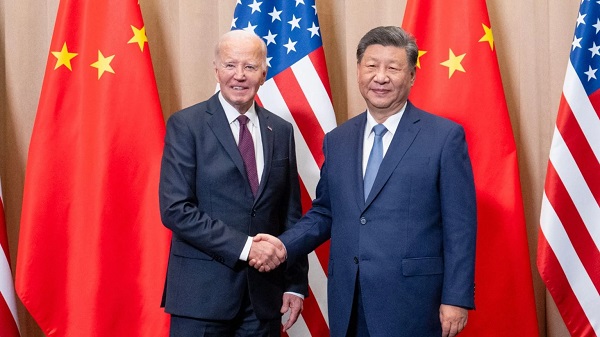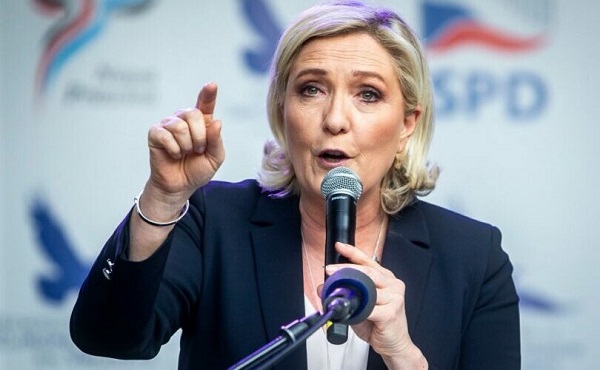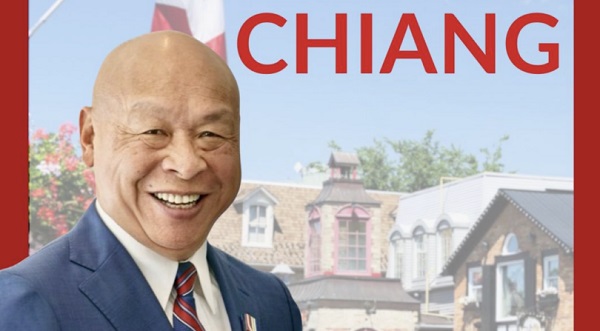Censorship Industrial Complex
G20’s Online Speech Clampdown Calls Set To Ignite Free Speech Fears

G20 leaders convened in Rio de Janeiro have called for enhanced responsibility and transparency from digital platforms to tackle the growing challenges of “misinformation,” “disinformation,” “hate speech,” and others on their long list of supposed online “harms.”
The summit’s final declaration highlighted the transformative role of digital platforms in global communication but noted the adverse effects of digital content’s rapid spread. It called for increased accountability from platforms to manage speech, which should raise eyebrows among free speech advocates who’ve heard all this before.
We obtained a copy of the declaration for you here.
During the summit, the leaders highlighted the transformative impact of digital platforms in communication and information dissemination across the globe. However, they also alleged negative ramifications of unchecked digital spaces, where “harmful” content can proliferate at an unprecedented pace and scale.
In response, the G20’s final declaration underscored the critical role of digital platforms in ensuring their ecosystems do not become breeding grounds for speech they don’t like.
The declaration states: “We recognize that digital platforms have reshaped the digital ecosystem and online interactions by amplifying information dissemination and facilitating communication within and across geographical boundaries. However, the digitization of the information realm and the accelerated evolution of new technologies, such as artificial intelligence (AI), has dramatically impacted the speed, scale, and reach of misinformation and disinformation, hate speech, and other forms of online harms.”
The G20 goes on to say that it emphasizes the “need for digital platforms’ transparency and responsibility in line with relevant policies and applicable legal frameworks and will work with platforms and relevant stakeholders in this regard.”
The declaration even says more measures need to be taken to control what it says is the spread of online misogyny and the need to combat it “online and offline.”
Censorship Industrial Complex
France condemned for barring populist leader Marine Le Pen from 2027 election

From LifeSiteNews
By Frank Wright
It remains to be seen how long the rule of lawfare can last against the rising demand for popular politics. The globalist remnants across the West are now liberal democracies in name only.
Marine Le Pen, the former leader of the populist French opposition party, has been sentenced to prison and barred from standing for election as president in 2027, following a court ruling against her for alleged financial crimes.
Le Pen is currently leading polls to win the presidential election, being 11 to 17 points ahead of the party of the globalist President Emmanuel Macron.
The ruling Monday on charges of “misuse of EU funds” sees Le Pen, leader of the National Rally (RN) party, facing two years’ imprisonment and a five-year ban on running for elected office. Her lawyer stated she would appeal the ruling.
Speaking a day before the verdict, Le Pen said, “There are 11 million people who voted for the movement I represent. So tomorrow, potentially, millions and millions of French people would see themselves deprived of their candidate in the election.”
She is to address the French nation in a televised statement Monday night.
Party leader Jordan Bardella responded on X, saying, “Today, it is not only Marine Le Pen who is unjustly condemned: it is French democracy that is being executed.”
Bardella has called for “peaceful mobilization” in support of Marine Le Pen, with a petition launched in protest at the “democratic scandal” of her effective cancellation as a candidate.
The RN won 33 percent of the vote in the first round of the 2024 French parliamentary elections, being the single largest party overall. It is prevented from entering government by a “cordon sanitaire” – an agreement between liberal-global and left-wing parties to “firewall” national-populists from power regardless of how many people vote for them.
The same system prevents Germany’s AfD and Austria’s FPO from governing. The AfD won 25 percent of the national vote, and the FPO came first in the Austrian elections – both held last year. More recently, Romanian presidential candidate Calin Georgescu saw his victorious presidential election canceled and him barred from running again, in what was described as a “globalist coup.”
Le Pen’s appeal would suspend the jail sentence and the fine of 100,000 euros – but would not be heard until 2026, effectively sabotaging her preparations for the 2027 election should she win. The ban takes effect when the appeal process is exhausted, meaning Le Pen is free to campaign until her appeal is heard in a year’s time.
The court ruled that Le Pen, whose RN was the single largest party in the recent French parliamentary elections, had misused 3 million euros in EU funds by paying party officials based in France.
She had told France’s La Tribune Dimanche on Saturday that “the judges have the power of life or death over our movement.”
The judges appear to have given her party a death sentence. Eight further RN members and twelve assistants were also found guilty in the same trial.
Elon Musk has warned the move will “backfire,” with globalist house magazine The Economist in agreement that “her sentence for corrupt use of EU funds could strengthen the hard right.” Its report stated, “Barring Marine Le Pen is a political earthquake for France.”
The shockwaves have reached across Europe, and around the world. Italy’s Deputy Prime Minister Matteo Salvini called the court’s ruling a “declaration of war by Brussels,” joining Dutch and Hungarian national-populist leaders Geert Wilders and Viktor Orban in condemnation of the move.
According to commentators, the legal ruling shows that the liberal-global regime is now canceling democracy. Independent journalist Michael Shellenberger said on X of worldwide globalist moves to criminalize its opponents: “This is a five alarm fire.”
Citing the lawfare undertaken against then-candidate Donald Trump, former State Department official Mike Benz described the many examples of the rule of lawfare were “a dagger in the heart of democracy”:
Donald Trump Jr. asked whether the French judiciary are “just trying to prove JD Vance was right” – referring to the vice president’s “blistering attack on European leaders” over their rising censorship and anti-democratic moves. Vance told EU and UK leaders in Munich, “Democracy rests on the sacred principle that the voice of the people matters. There is no room for firewalls. You either uphold the principle or you don’t.”
U.S. political strategist Steve Bannon also referenced populist figures facing legal persecution in his “War Room” rundown of the Le Pen affair today:
The move to legally “firewall” Le Pen has left even her political opponents disturbed, with the ruling Prime Minister Francois Bayrou reportedly “disquieted” by the verdict. Jean-Luc Melenchon, the leader of the left-liberal LFI and a determined political enemy of Le Pen, has said, “The decision to remove an elected official should be up to the people” – not the courts.
Right-populist leader Eric Zemmour, who coined the term “remigration,” warned of a “coup d’etat” of activist judges in 1997 – and said today that “everything has to change” as “it is not for judges to decide for whom the people must vote.”
Laurent Wauquiez of the conservative Les Republicains – who have also refused to work with the RN in coalition – said, “The decision to condemn Marine Le Pen is heavy and exceptional. In a democracy, it is unhealthy that an elected official be forbidden to stand for election.”
It seems this latest example of liberal-global lawfare may even see Le Pen’s party rise in the polls, with a survey today showing two-thirds of all French voters saying her ineligibility would not stop them voting for her RN party.
Nearly half of voters believe she was treated harshly “for political reasons,” with a quarter believing the move to bar her will be a “trump card” for the party overall.
Whether the move “backfires” or not, the message to Western electorates is becoming clear. You can vote for liberals of the left, right, or center – because anyone offering a real alternative will be locked out of power, or locked up in jail.
It remains to be seen how long the rule of lawfare can last against the rising demand for popular politics. After canceled elections, speech crackdowns, and criminalizing their opponents, the globalist remnants across the West are now liberal democracies in name only.
Censorship Industrial Complex
Welcome to Britain, Where Critical WhatsApp Messages Are a Police Matter

By
“It was just unfathomable to me that things had escalated to this degree,”
“We’d never used abusive or threatening language, even in private.”
|
You’d think that in Britain, the worst thing that could happen to you after sending a few critical WhatsApp messages would be a passive-aggressive reply or, at most, a snooty whisper campaign. What you probably wouldn’t expect is to have six police officers show up on your doorstep like they’re hunting down a cartel. But that’s precisely what happened to Maxie Allen and Rosalind Levine — two parents whose great offense was asking some mildly inconvenient questions about how their daughter’s school planned to replace its retiring principal.
This is not an episode of Black Mirror. This is Borehamwood, Hertfordshire, 2025. And the parents in question—Maxie Allen, a Times Radio producer, and Rosalind Levine, 46, a mother of two—had the gall to inquire, via WhatsApp no less, whether Cowley Hill Primary School was being entirely above board in appointing a new principal.
What happened next should make everyone in Britain pause and consider just how overreaching their government has become. Because in the time it takes to send a meme about the school’s bake sale, you too could be staring down the barrel of a “malicious communications” charge.
The trouble started in May, shortly after the school’s principal retired. Instead of the usual round of polite emails, clumsy PowerPoints, and dreary Q&A sessions, there was… silence. Maxie Allen, who had once served as a school governor—so presumably knows his way around a budget meeting—asked the unthinkable: when was the recruitment process going to be opened up?
A fair question, right? Not in Borehamwood, apparently. The school responded not with answers, but with a sort of preemptive nuclear strike.
Jackie Spriggs, the chair of governors, issued a public warning about “inflammatory and defamatory” social media posts and hinted at disciplinary action for those who dared to cause “disharmony.” One imagines this word being uttered in the tone of a Bond villain stroking a white cat.
|
 |
Parents Allen and Levine were questioned by police over their WhatsApp messages. |
|
For the crime of “casting aspersions,” Allen and Levine were promptly banned from the school premises. That meant no parents’ evening, no Christmas concert, no chance to speak face-to-face about the specific needs of their daughter Sascha, who—just to add to the bleakness of it all—has epilepsy and is registered disabled.
So what do you do when the school shuts its doors in your face? You send emails. Lots of them. You try to get answers. And if that fails, you might—just might—vent a little on WhatsApp.
But apparently, that was enough to earn the label of harassers. Not in the figurative, overly sensitive, “Karen’s upset again” sense. No, this was the actual, legal, possibly-prison kind of harassment.
Then came January 29. Rosalind was at home sorting toys for charity—presumably a heinous act in today’s climate—when she opened the door to what can only be described as a low-budget reboot of Line of Duty. Six officers. Two cars. A van. All to arrest two middle-aged parents whose biggest vice appears to be stubborn curiosity.
“I saw six police officers standing there,” she said. “My first thought was that Sascha was dead.”
Instead, it was the prelude to an 11-hour ordeal in a police cell. Eleven hours. That’s enough time to commit actual crimes, be tried, be sentenced, and still get home in time for MasterChef.
Allen called the experience “dystopian,” and, for once, the word isn’t hyperbole. “It was just unfathomable to me that things had escalated to this degree,” he said. “We’d never used abusive or threatening language, even in private.”
Worse still, they were never even told which communications were being investigated. It’s like being detained by police for “vibes.”
One of the many delightful ironies here is that the school accused them of causing a “nuisance on school property,” despite the fact that neither of them had set foot on said property in six months.
Now, in the school’s defense—such as it is—they claim they went to the police because the sheer volume of correspondence and social media posts had become “upsetting.” Which raises an important question: when did being “upsetting” become a police matter?
What we’re witnessing is not a breakdown in communication, but a full-blown bureaucratic tantrum. Instead of engaging with concerned parents, Cowley Hill’s leadership took the nuclear option: drag them out in cuffs and let the police deal with it.
Hertfordshire Constabulary, apparently mistaking Borehamwood for Basra, decided this was a perfectly normal use of resources. “The number of officers was necessary,” said a spokesman, “to secure electronic devices and care for children at the address.”
Right. Nothing says “childcare” like watching your mom get led away in handcuffs while your toddler hides in the corner, traumatized.
After five weeks—five weeks of real police time, in a country where burglaries are basically a form of inheritance transfer—the whole thing was quietly dropped. Insufficient evidence. No charges. Not even a slap on the wrist.
So here we are. A story about a couple who dared to question how a public school was run, and ended up locked in a cell, banned from the school play, and smeared with criminal accusations for trying to advocate for their disabled child.
This is Britain in 2025. A place where public institutions behave like paranoid cults and the police are deployed like private security firms for anyone with a bruised ego. All while the rest of the population is left wondering how many other WhatsApp groups are one message away from a dawn raid.
Because if this is what happens when you ask a few inconvenient questions, what’s next? Fingerprinting people for liking the wrong Facebook post? Tactical units sent in for sarcastic TripAdvisor reviews?
It’s a warning. Ask the wrong question, speak out of turn, and you too may get a visit from half the local police force.
|
|
|
|
Reclaim The Net values your free speech and privacy. Each issue we publish is a commitment to defend these critical rights, providing insights and actionable information to protect and promote liberty in the digital age.
Despite our wide readership, less than 0.2% of our readers contribute financially. With your support, we can do more than just continue; we can amplify voices that are often suppressed and spread the word about the urgent issues of censorship and surveillance. Consider making a modest donation — just $5, or whatever amount you can afford. Your contribution will empower us to reach more people, educate them about these pressing issues, and engage them in our collective cause. Thank you for considering a contribution. Each donation not only supports our operations but also strengthens our efforts to challenge injustices and advocate for those who cannot speak out. Thank you.
|
-

 2025 Federal Election2 days ago
2025 Federal Election2 days ago‘I’m Cautiously Optimistic’: Doug Ford Strongly Recommends Canada ‘Not To Retaliate’ Against Trump’s Tariffs
-

 Business2 days ago
Business2 days agoCalifornia planning to double film tax credits amid industry decline
-

 Business2 days ago
Business2 days agoCanada may escape the worst as Trump declares America’s economic independence with Liberation Day tariffs
-

 Alberta2 days ago
Alberta2 days agoBig win for Alberta and Canada: Statement from Premier Smith
-

 Catherine Herridge2 days ago
Catherine Herridge2 days agoFBI imposed Hunter Biden laptop ‘gag order’ after employee accidentally confirmed authenticity: report
-

 Business1 day ago
Business1 day agoB.C. Credit Downgrade Signals Deepening Fiscal Trouble
-

 COVID-1923 hours ago
COVID-1923 hours agoTrump’s new NIH head fires top Fauci allies and COVID shot promoters, including Fauci’s wife
-

 2025 Federal Election2 days ago
2025 Federal Election2 days agoLiberal MP resigns after promoting Chinese government bounty on Conservative rival








